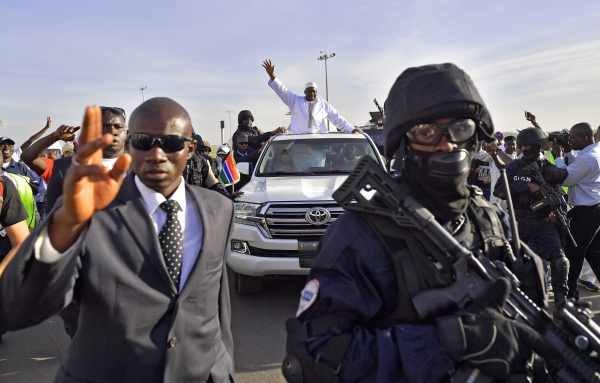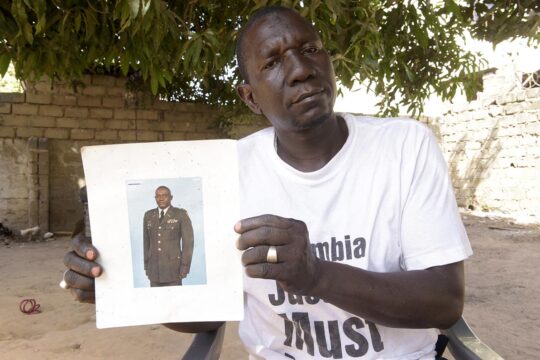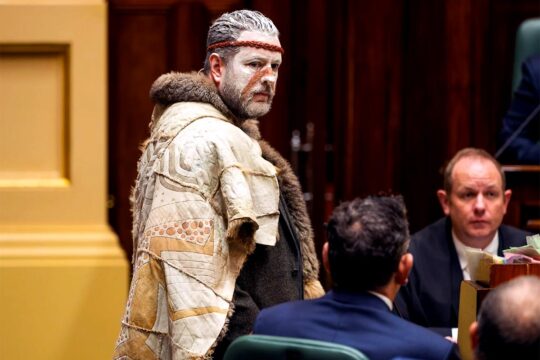It was under threat of a military intervention by the Economic Community of West African States (ECOWAS) that Yahya Jammeh, President of Gambia for 22 years, finally decided to cede power to the winner of the December 1, 2016 election. Jammeh, who is now in Equatorial Guinea, is counting on the protection of his host country to avoid accountability for the many crimes and human rights abuses committed under his regime.
As he went into exile on the night of Saturday January 21, Yahya Jammeh left behind him a wounded nation whose scars will take time to heal. Under the regime of the man who told Jeune Afrique magazine last May that he was proud to be a dictator, it was impossible to know the truth about the accusations of serious human rights abuses. Today, hardly a month after his departure, people are asking the questions which were taboo in Gambia before. Who ordered, supervised and carried out the numerous murders, forced disappearances, acts of torture and other abuses that have haunted for the last two decades this small African country of less than two million people wedged inside Senegal?
A litany of human rights violations
Who ordered and carried out in April 2000 the massacre of 14 people including six children during a peaceful demonstration? Who murdered journalist Deyda Hydara in December 2004 and why? Who were the “rogue” Gambian security force members involved in the killing of 50 foreign nationals in July 2005? Who is responsible for the enforced disappearance of journalist Ebrima Manneh in July 2006? Who secretly detained 1,000 people in a witch hunt in March 2009 and forced them to drink hallucinogenic liquids? These are among 20 cases of human rights violations selected in a 2014 report published by human rights NGOs Amnesty International, Article 19 and Rencontre Africaine pour la Défense des Droits de l’Homme (Raddho).
Between 2004 and 2016, other sinister events also added to the long list of human rights abuses in Gambia. In April 2016, the opposition organized demonstrations demanding electoral reforms and more freedoms in the country. The protests were put down and several demonstrators were arrested, including opposition activist Solo Sandeng who was later said to have died in detention. “Sandeng’s senseless death in custody appears to be the latest in a long line of abuses against the political opposition in Gambia,” said Corinne Dufka, West Africa director at Human Rights Watch. Article 19, Amnesty International and the UN all called for investigations. Reacting in Jeune Afrique, Jammeh told UN Secretary General at the time Ban Ki Moon to “go to hell” and that he would not be ordering any inquiry. “What’s the problem?” he asked. “People die in detention or during questioning, it happens quite often!”
Will Jammeh be prosecuted?
Several analysts agree that the death of Solo Sandenga was the final straw that drove people to reject the Jammeh regime in the last presidential election. The new Gambian authorities now have the delicate task to manage the heavy legacy of 22 years of human rights abuses and economic crimes. In an interview with journalists from several media in early December 2016, new president Adama Barrow said that if there were cases to be tried, his government would do so, that it would respect the Constitution and everyone’s rights, but no-one would be above the law.
So is Barrow likely to seek Jammeh’s prosecution? It will probably not be him, nor his government during its short mandate. The current task of the administration is to effect a smooth transition within a three-year period, which is too short to get international prosecutions against the former regime, and it needs to introduce major institutional and electoral reforms. On the other hand, the new government is promising to launch a transitional justice process.
“The new president wants to put in place a Truth, Justice and Reconciliation Commission,” says Gambian activist Aisha Dabo, member of the Dakar-based West African think-tank Wathi. “That would be a way to deal with the past left by Jammeh. But I wonder when this commission will be created and become operational, because it could take time and people are not necessarily patient.”
“Gambians need to know the truth, to reconcile and to forgive,” she continues, “but not at the price of impunity, because justice must be done, to serve as an example and deter those who want to return to the bad habits of the past. Otherwise Gambian society will remain divided, frustrated. Jammeh has already divided it along ethnic, religious and rich/poor lines.”
Safe in Equatorial Guinea
Jammeh’s choice of country of exile is not by chance. In West Africa, apart from Togo, democratic change is gradually becoming part of political culture, so there would be no long-term security for him in the region. On the other hand, Equatorial Guinea in central Africa has been ruled for 38 years by the same regime and there are no signs of imminent change. It is not a member of the International Criminal Court, so its President Obiang NGuéma would be under no obligation to meet any ICC demand for Jammeh’s transfer to The Hague, unless there were a special procedure initiated by the UN. Yahya Jammeh has therefore chosen one of the “safest” African countries for himself and his family.
But whereas Jammeh, his family and a few of his closest aides have been safe in Equatorial Guinea since January 21, others among those close to him were not able to get on his plane and are not immune from surprises. Two leading members of the former regime have already been detained. Ousman Sonko, former Interior Minister and one of Jammeh’s right-hand men, has been detained in Switzerland after a criminal complaint was filed by NGO Trial International. General Bora Colley, who directed one of Jammeh’s feared prisons, has also been arrested in the southern Senegalese region of Casamance, as he was trying to get to neighbouring Guinea Bissau. In addition, a group of lawyers is gathering evidence from Dakar, Senegal, against the former President who claimed to have special powers including being able to cure AIDS.
So how can the dual needs of justice for victims and social cohesion be reconciled? There have been increasing calls for moderation, like that of the Pax Africana foundation of former African Union Secretary General Edem Kodjo. “As Gambia turns a new political page, PAX AFRICANA again calls on the new Gambian authorities to give priority to promoting national cohesion,” the foundation said in a communiqué on January 26, “and above all to show moderation in their efforts to shed light on the reality of what happened during the Jammeh era.”






